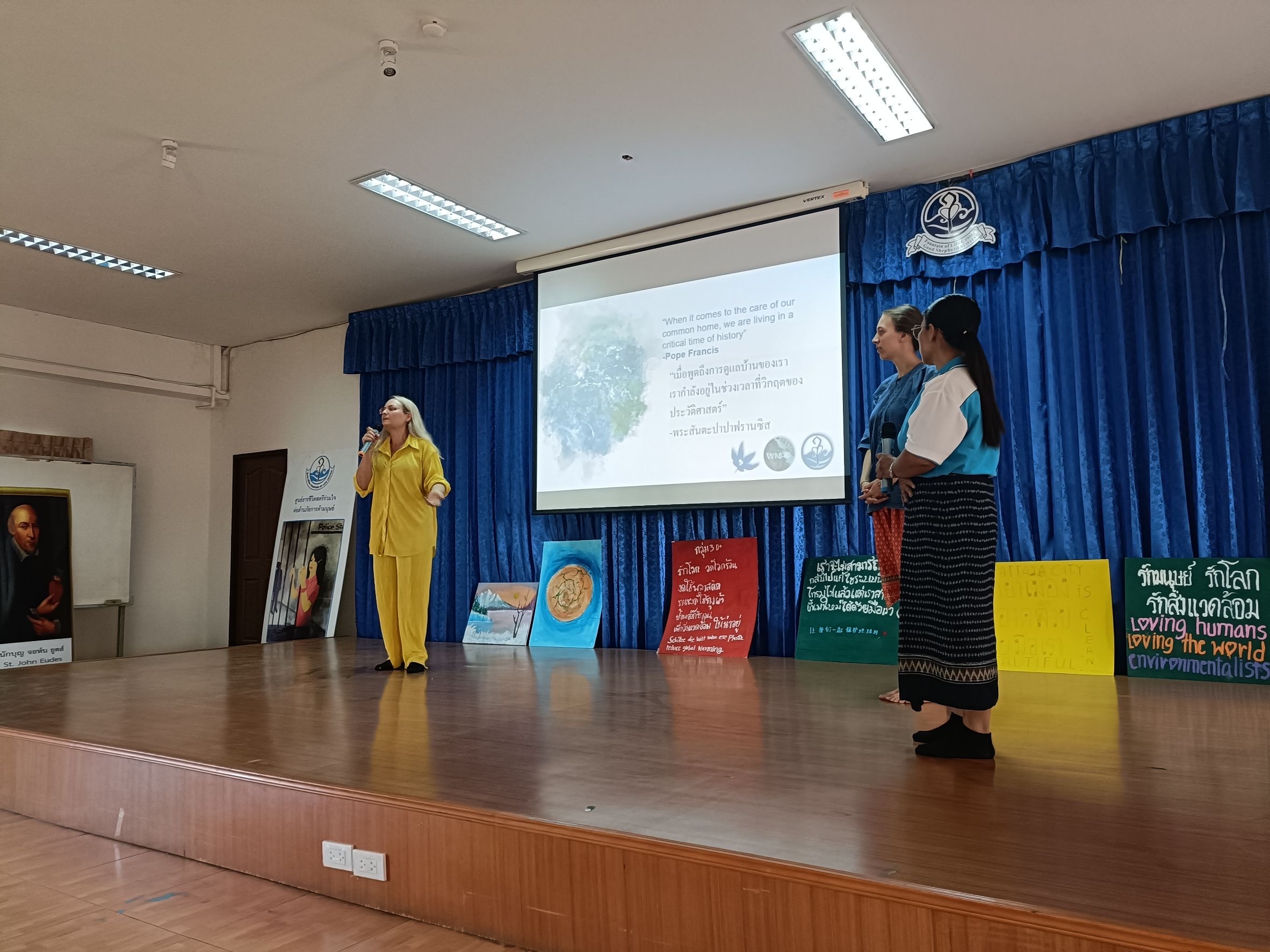Empowering Communities through Environmental Awareness Education

In a world facing pressing environmental challenges, it has become increasingly vital to raise awareness and educate communities about the importance of environmental protection. Recognizing this need, Ms. Anna Neya launched an environmental awareness education course last year. The course was generously donated to Good Shepherd Thailand, which has been implemented in charity centers across the congregation.

This course aims to empower vulnerable communities by fostering a sense of responsibility and care for our planet - our only home. With a focus on key issues such as environmental degradation, air and water pollution, global warming, deforestation, and plastic pollution, the course consists of nine mini-sessions taught by dedicated staff and volunteers on a weekly basis.
- Understanding Environmental Degradation
The course starts by providing participants with an in-depth understanding of environmental degradation and its consequences. Through engaging discussions and informative sessions, participants learn about the various factors contributing to environmental deterioration and the importance of collective action in addressing these issues.
- Exploring Air and Water Pollution
Air and water pollution pose significant threats to both human and environmental health. The course dedicates sessions to exploring the causes and impacts of air and water pollution and strategies to mitigate their effects. Participants gain valuable insights into practical steps they can take to reduce pollution in their own lives.
- Tackling Global Warming
Global warming is a pressing issue affecting our planet. The course emphasizes the urgent need to address climate change and its far-reaching consequences. Participants learn about the causes of global warming, its impacts on ecosystems and vulnerable communities, and the importance of adopting sustainable practices to mitigate climate change.
- Understanding Deforestation
Deforestation has devastating effects on biodiversity, climate, and local communities. The course raises awareness about deforestation and its consequences, emphasizing the importance of sustainable forestry practices, reforestation efforts, and the preservation of vital ecosystems.
- Combating Plastic Pollution
Plastic pollution has become a global crisis, threatening marine life, polluting waterways, and impacting human health. The course educates participants on the detrimental effects of plastic pollution and encourages the adoption of sustainable alternatives and responsible waste management practices to minimize plastic consumption.

Environmental awareness education is a powerful tool that can transform communities and empower individuals to take meaningful action for the planet. When implemented in centers supporting vulnerable communities, it has the potential to create a positive ripple effect, bringing about sustainable change and nurturing a deep connection with the environment. In this blog post, we will explore five compelling reasons why implementing environmental awareness education in such centers is crucial. From fostering environmental stewardship to building resilience to climate change, these reasons highlight the profound impact such education can have on both individuals and the planet we call home. Let's delve into these reasons and discover the transformative power of environmental awareness education.

- Empowering Environmental Stewardship: Implementing environmental awareness education in centers supporting vulnerable communities empowers individuals to become environmental stewards. By educating them about the importance of environmental conservation and sustainability, they can actively participate in protecting their surroundings and take responsibility for their actions.
- Promoting Sustainable Practices: Environmental awareness education equips individuals with knowledge about sustainable practices. They learn about energy conservation, waste reduction, and responsible consumption, enabling them to make informed choices that positively impact the environment. Implementing such practices within vulnerable communities helps create a greener and more sustainable future.
- Enhancing Health and Well-being: Environmental degradation, such as air and water pollution, directly affects the health and well-being of vulnerable communities. By implementing environmental awareness education, individuals gain an understanding of how environmental factors impact their health and learn ways to mitigate those risks. This knowledge empowers them to protect their well-being and that of future generations.
- Creating Economic Opportunities: Environmental awareness education can also open up new economic opportunities for vulnerable communities. By understanding sustainable practices and the green economy, individuals can explore environmentally friendly livelihood options, such as eco-tourism, organic farming, or renewable energy projects. This helps foster economic growth and resilience in these communities.
- Building Resilience to Climate Change: Vulnerable communities often bear the brunt of climate change impacts. By implementing environmental awareness education, individuals become better prepared to adapt to and mitigate the effects of climate change. They learn about climate-resilient practices, disaster preparedness, and the importance of preserving natural resources, helping build resilience, and reducing vulnerabilities.

Environmental awareness education plays a crucial role in empowering communities and fostering sustainable practices. The environmental awareness course developed by Ms. Anna Neya and implemented by Fountain of Life Women's Center, Good Shepherd Thailand, serves as a powerful tool to instill knowledge, inspire action, and promote environmental stewardship among vulnerable communities. By equipping individuals with the necessary knowledge and tools, this course contributes to the protection of our planet and the well-being of future generations. Let us all commit to embracing a sustainable lifestyle and caring for our shared home, the Earth.
Stay tuned for updates on the progress of this initiative and join us in making a positive impact on the environment and the lives of vulnerable communities.









